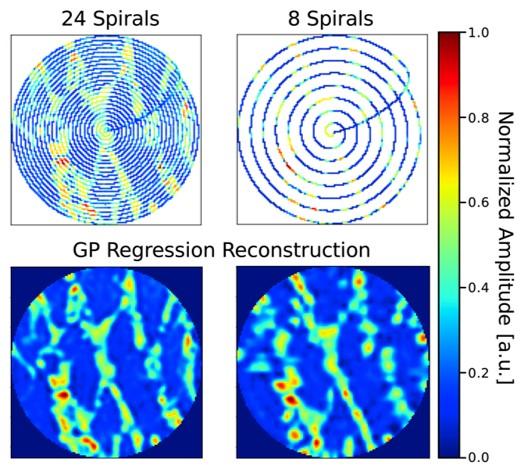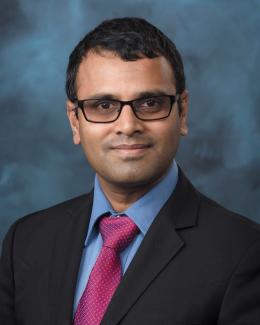
PFM of a CuInP2S6 van der Waals crystal and associated reconstructions.
Top: Normalized raw PFM amplitude images from 24 (left) and 8 (right) spirals.
Bottom: Gaussian processing regression image reconstruction of sparse spiral scans (top). Even with a sparse scan, the reconstruction performs well to reproduce the image, enabling faster scanning.
Top: Normalized raw PFM amplitude images from 24 (left) and 8 (right) spirals.
Bottom: Gaussian processing regression image reconstruction of sparse spiral scans (top). Even with a sparse scan, the reconstruction performs well to reproduce the image, enabling faster scanning.
Scientific Achievement
Demonstrated a new method to rapidly image samples with scanning probe microscopy (SPM).
Significance and Impact
Method can be used to reconstruct images from scans 5x faster than traditional SPM methods to study dynamics previously inaccessible in typical instrument setups.
Research Details
- Sparse spiral scans with different densities were used in piezoresponse force microscopy (PFM) to acquire the imaging data.
- Imaging data was used to reconstruct the full (dense) image via Gaussian process regression and compressed sensing and showed >5x speed-up with less than 6% reconstruction error.
- This method is general and can be utilized for both scanning probe and electron microscopies.
K. P. Kelley, M. Ziatdinov, L. Collins, M. A. Susner, R. K. Vasudevan, N. Balke, S. V. Kalinin, and S. Jesse, "Fast Scanning Probe Microscopy via Machine Learning: Non-Rectangular Scans with Compressed Sensing and Gaussian Process Optimization," Small 16, 2002878 (2020). DOI: 10.1002/smll.202002878





